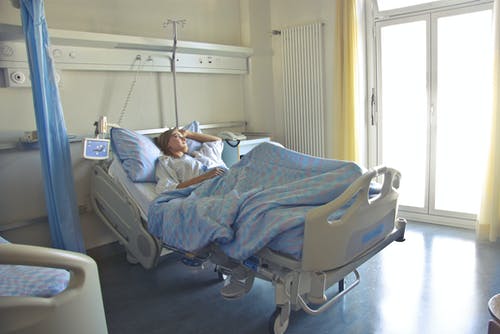There’s no denying that the current treatment offered to people with eating disorders is far from foolproof.
The success rates in terms of the number of people who go on to fully recover from eating disorders are uninspiringly low, even if they receive “gold standard” treatment.
I don’t believe eating disorders are so impossibly hard to treat that we need to be getting it wrong more often than not but clearly something isn’t working, but what?
I have many answers to that question and most of them can be largely amended by including people who have lived experience with recovery from eating disorders in the design and delivery of treatment.
For a couple of years now, I have been a part of doing just this.
For a couple of years I’ve devoted some of my time, energy and a great deal of my heart to being a part of training medical professionals to help them understand and better care for their patients living with eating disorders.
During these trainings the questions asked by the hospital staff including doctors, dietitians, psychologists and psychiatrists prompt me to remember and describe as best I can a world and a way of being that has become so foreign to me it’s almost like remembering a dream.
Today’s blog is a continuation of the blog How Do You Battle with Your Thoughts on Bad Days Now? My Honest Answers to 3 Common Questions Health Professionals Ask Me About My Recovery from Anorexia Nervosa with 3 more questions health professionals ask me about my experience with the mainstream medical treatment I received when I was trying to recover from anorexia nervosa.
Whether you are a health professional, or you’re close to someone living with an eating disorder or you are living with an eating disorder I hope my answers to these questions empower you to become an active part of changing the success stats around eating disorder recovery.
That would be a dream come true for me.
When I Ask My Patients What They Want, They Shut Down. How Can I Motivate Them?

Don’t ask.
Don’t motivate.
It’s ok if they’re not motivated.
It’s ok if they can’t rattle off a bundle of successful life goals they have in mind for their future.
Because you know what’s cool about all that? They don’t need to be any of it or have any of it.
They don’t need to in order to recover.
When I was sick there was nothing worse than bland reassurances that things would be ok.
I could see right through them. It was uncomfortable. I often felt more pity for the person reassuring me, even as I nodded my head in agreement, than I did for myself. We both knew we were lying.
The fact is it may not all be ok.
You may never achieve the things you want in life.
And you may never recover.
When you’re lying in a hospital bed, exhausted, cords and tubes and machines hooked up to you left right and centre, with 24/7 monitoring it’s all just a possibility that you’ll recover. It’s also a possibility that you won’t.
At no point in time is it truly a guarantee that you will recover.
When I was sick there was nothing worse than being asked what I wanted.
I was so out of touch with myself that I honestly didn’t know what I wanted.
Which meant that being asked what I wanted brought my massive sense of failure over all I’d not achieved, how cruel and unfair the world was and how I didn’t really want to be a part of it to the surface.
I remember everything I did or didn’t do during the years I lived with anorexia nervosa was motivated by fear.
I was months deep into recovery before I developed an ability to be positively motivated in a way that allowed me to use fear or stress as a guide to not do that thing. When you live with an eating disorder there is no amount of education about the health effects that can get you out of it, there is no amount of shame about the people you’re hurting that can get you out of it. All that stuff just drags you into it further because it creates incredible stress, and the eating disorder behaviours are how you cope when you are stressed.
It took me time and most of all a lot of outside practical guidance (clinical hypnotherapy) to develop a connection to my inner self. And even longer still to be able to express that inner self.
If you’re working with people in recovery from eating disorders, you really must develop the skill of meeting people where they are.
It’s ok to work with a patient exactly where they are.
It’s ok to not be the one to “get through to them.” Which if you’re working with someone in a hospital setting it’s unlikely you will be.
Know where to refer on after they’ve left so they can develop the skills that will make that hospitalisation their last hospitalisation.
2. How Do I Approach the Topic of Buying Larger Clothes After Weight Gain During Hospitalisation with My Patient?

Just say it.
Be honest.
They know that if they are undereating then weight gain is a necessary part of their recovery.
You know that if they are undereating then weight gain is a necessary part of their recovery.
It’s not a secret.
There is no advantage to pretending these things won’t happen or avoiding talking about them because it’s uncomfortable. At some point if real recovery is their goal they’re going to happen.
You may not be able to fix or takeaway their uncomfortableness as they gain weight, and the wonderful thing is you don’t have to. It’s not necessary to feel comfortable in recovery 100% of the time but if we want to make any meaningful impact or change it is necessary to have honesty 100% of the time.
Imagine being in the situation of feeling so lost, dysregulated, and inadequate in the world that you are incapable of doing one of the most very basic tasks in life; feeding yourself.
Imagine.
Truly take just one moment now to imagine what that would be like.
That’s your patient’s daily reality.
Fear is the foundation of this human being’s existence.
They don’t need any more pretence or protection.
They need the truth.
They need to trust and to know that there is hope and kindness within the people who make up the world they are recovering into.
The more things we can openly discuss with our patients the more we empower them. The more things we openly discuss with our patients the more we allow them to take the steering wheel of their lives.
Which surely must be the goal of any meaningful attempt at assisting someone along the path of their recovery.
Be honest, be kind but absolutely have the discussion with them.
3. I’m Just Delivering Treatment and They Respond as Though I’m Threatening Them, Why?

Because you are.
Because when you are “delivering treatment” you are asking them to do the things they are most afraid of.
When you are living with anorexia nervosa eating is perceived as a threat.
And that’s not an exaggeration.
When I lived with anorexia nervosa there is no other way to describe eating other than terrifying. Even the thought of eating was terrifying.
I skydived.
I bungee jumped.
I backpacked solo through Mexico.
I did all sorts of traditionally “dangerous” and “scary” things without fear.
All while I was terrified, utterly terrified of a slice of bread, a plate of food, an unexpected snack.
And simultaneously so utterly ashamed that this was true for me.
I know now there is ample evidence showing that the parts of the brain which light up when people living with anorexia nervosa are presented with food or even think about food are those responsible for the “fight or flight” response.
Food is perceived as a threat.
This response is the same response that happens when your heart skips a beat as someone pulls out on you in traffic and you slam on your breaks to avoid hitting them.
Your body has already reacted before your conscious mind has even caught on that there was something to react to.
It’s not their conscious decision to make it so but the reality is that somewhere along the line the body of a person who lives with anorexia nervosa has associated food with a threat and that’s the response it now gives, automatically and unconsciously.
They are no longer trying to lose weight (if they ever were), trying to eat healthy (if they ever were) or trying to restrict their food intake in any way (if they ever were) consciously. Once a person has developed anorexia nervosa that is all now under the control of their unconscious.
It’s their normal.
If you are working in eating disorder treatment, have someone you love living with an eating disorder or are yourself in recovery from an eating disorder I truly believe this is one of the first things you must know.
They are not choosing it.
You are not choosing it.
Let those misconceptions and ignorance go and you’ll advance in leaps and bounds.
When you leave the shame, blame and inadequacy and the expectation that you can just consciously choose otherwise behind you’ll have room to move.
To breathe.
To do.
To be.
When health professionals say variations of “that is the treatment I have to offer and my patient says I’m threatening them” it’s as though they are pissed off or at the least frustrated that this person can’t just accept the treatment, heal and move on.
And I get it. I too wish it were that easy.
I wish it were that easy for any illness that human beings suffer from.
But it’s not and we have to work with that reality.
I can share, from my experience of having been that person in the hospital bed diligently and desperately following every instruction that doing so didn’t cure me.
Your treatment isn’t going to cure them even if they follow it to a t.
What I really want people who work in eating disorder treatment to takeaway is that you can deliver the very same treatment that, yes I fully acknowledge and appreciate you do have to deliver, with kindness versus threat.
Compassion versus blame.
To give you a quick example of how this change of frame would look and sound in real life read these two scenarios and feel how they feel.
- Threatening/disempowering frame: doctor/nurse/dietitian: “you will have to have the supplement if you don’t finish your food and if you refuse the supplement you will have to have an NG tube put in”.
- Compassionate/empowering frame: doctor/nurse/dietitian: “I don’t understand what you’re going through, but it looks so tough for you right now. If you can’t manage to eat all your food, it’s ok you can have a supplement and if you really can’t manage a supplement at this stage it’s ok because I can help you to get a NG tube put in which may take the decision and pressure off you until you’re feeling stronger”.
In the end the same treatment is delivered but only one option is going to allow for the patient to feel seen and empowered.
Interestingly we seem to do the second mode of treatment delivery with all other medical concerns.
When I was hospitalised, I never heard the other patients on the wards spoken to and threatened in the way I was.
Having now worked as a clinical hypnotherapist and dietitian with hundreds to thousands of people in recovery for eating disorders I’ve listened to many stories about medical treatment, and I wish I could say otherwise but the truth is more often than not these stories are of pain and shame. Not empowerment.
Let’s be proactive in changing the stories for future eating disorder patients.
Summary

In summary to the answers I give to the above 3 questions I’m commonly asked by health professionals working in hospitals with patients in treatment for eating disorders.
- When I ask my patients what they want, they shut down. How can I motivate them?
Imagine being too afraid to feed yourself properly.
Imagine being so out of touch with your body and confused that you actually felt you didn’t know how to feed yourself properly even if you weren’t afraid.
Imagine having such low self-worth that you didn’t believe you deserved to eat adequately even if you knew how.
That’s your patient.
They’re not being intentionally difficult, noncompliant or other terms that truly should be obsolete now. They’re operating from fear. Even if they can have reasonable, intelligent conversations around food I can guarantee they are operating from fear when they’re in the moment. When they’re in the moment the fear takes over. It is all consuming and no amount of intelligence or prior conversations changes that.
Know that it might not be your role to motivate them.
Care for them and ensure they have follow on treatment when they leave the hospital.
Treatment that can help them to develop all the things I listed above – remove the fear, increase resources and skills to trust themselves, develop connection to their body and the self-worth to believe they deserve to do all this.
- How do I approach the topic of buying larger clothes after weight gain during hospitalisation with my patient?
With honesty.
With compassion but at the same time with honestly.
They know and you know that weight gain is a part of their treatment and the greatest thing you can do is be honest with them that with weight gain comes changes in clothing sizes and they’re going to have to get some new clothes that fit their body. Simple.
They may need help to learn how to be ok with the thoughts that come with going up sizes in clothes and buying new clothes but that’s likely going to be the role of someone else to truly provide that.
Know where to refer them on.
- I’m Just Delivering Treatment and They Respond as Though I’m Threatening Them, Why?
Sigh. Food is perceived as a threat. Therefore, you are threatening them if you are demanding that they just eat.
At the end of the day it is very important that you deliver the treatment you are there to deliver but please consider there are a multitude of different ways you can deliver the very same treatment.
Choose the compassionate way.
Choose the patient empowering way.
With my whole heart I hope you found this information useful and inspiring.

Become Great. Live Great.
Bonnie.



